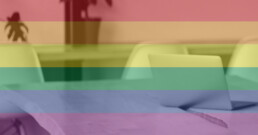Say This, Not That | LGBTQ+ Inclusive Language Edition
Bijoy Shah, Envision RISE, Diversity, Inclusion & Belonging Specialist
It’s Pride Month! This is a time of celebration for the LGBTQ+ community and their allies and advocates. If you want to support the LGBTQ+ community, it’s important to understand how your language can be either supportive or harmful. Let’s take a journey to more inclusive language.
First, let’s explore what you might want to say if someone comes out to you. For LGBTQ+ people, the act of coming out is not a one-time experience. Throughout their lives they are faced with having to come out over and over again to family, friends, employers, coworkers, neighbors and medical professionals. Each time there is a risk of rejection or judgment. If you are given this gift of vulnerability and trust, please respect it. There is no need to ask the person “Are you sure?” or “Have you always felt this way?” A simple “Thank you for sharing that with me,” will suffice in most situations. If it is your child or other loved one, try not to say, “I love you no matter what.” This suggests that their sexual orientation is a flaw to be overlooked.
Some LGBTQ+ terms are generally falling out of favor. However, there are still some LGBTQ+ people who use them to refer to themselves and, when in such a scenario, we should mirror the terms we hear back. In general, it is respectful to swap out these outdated terms with the new term, boosting inclusion in everyday life. Mind you, this is a primer, not a definitive list.
Before we get into a few terms, here are some definitions to help clarify a few things:
Biological Sex
This is the determination made at birth, using genitalia to assign biological sex. Some trans people use the phrase “Assigned Female at Birth” or “Assigned Male at Birth” (AFAB, AMAB). This is not the same as gender.
Gender Identity
Gender is not limited to biological sex. People whose gender identity matches their biological sex are called cisgender. For some people, their gender identity does not match their biological sex.
Gender Expression
This is how an individual outwardly presents themselves through clothing, hairstyle, etc. For instance, a lesbian may identify as a woman, but her gender expression is more masculine than feminine.
Now, let’s upgrade to more inclusive language.
Say Transgender Instead of Transsexual
“Transsexual” is a dated term that is falling out of favor, especially with Millennials and Generation Z. Some people dislike this word because it has the word “sexual” in it, which tends to reinforce the mistaken notion that all things LGBTQ+ are only focused on sex. Others feel that the word is inaccurate because the term focuses on a person’s biological sex rather than their gender identity. In addition, the term holds a negative connotation, as it was originally used within psychological communities to diagnose trans people with mental disorders. Most people use the term “transgender” or simply “trans.”
Use Gay Instead of Homosexual
Many people dislike the word “homosexual” for the same reasons that people dislike the term transsexual. It has the word sexual in it, and the term was originally used within psychological communities to diagnose gay people as having a mental disorder.
Use Typical Instead of Normal
When we are discussing gender identities, gender expressions, or biological sexes that are common or expected, it’s respectful to use the word “typical.” Try to avoid the word “normal.” The opposite of normal is abnormal, which has a fairly rude connotation, averting any semblance of inclusion and equity.
Use Intersex Instead of Hermaphrodite
“Hermaphrodite” is a dated and inaccurate term that pathologizes natural body variation. When talking about intersex individuals, also avoid words like “condition” or “disorder.” These words imply that being intersex is wrong or unnatural, destroying any hope of inclusive spaces. Intersex people have natural biological variations.
Living in the woods without electricity, running water, and a toothbrush is a lifestyle. Being LGBTQ+ is not. It is the identity of a person.
Avoid the Word Lifestyle Altogether
Living in the woods without electricity, running water, and a toothbrush is a lifestyle. Being LGBTQ+ is not. It is the identity of a person. Avoid the word “lifestyle” in the context of LGBTQ+ people and lives. A lifestyle is a choice, gender identity and sexual orientation are not choices.
This list in not intended to be exhaustive, but rather a first step in using more inclusive language. The Human Rights Campaign has an excellent glossary of terms for everything related to the LGBTQ+ community. Learning the correct terminology will help make communication and offering support easier! https://www.hrc.org/resources/glossary-of-terms
